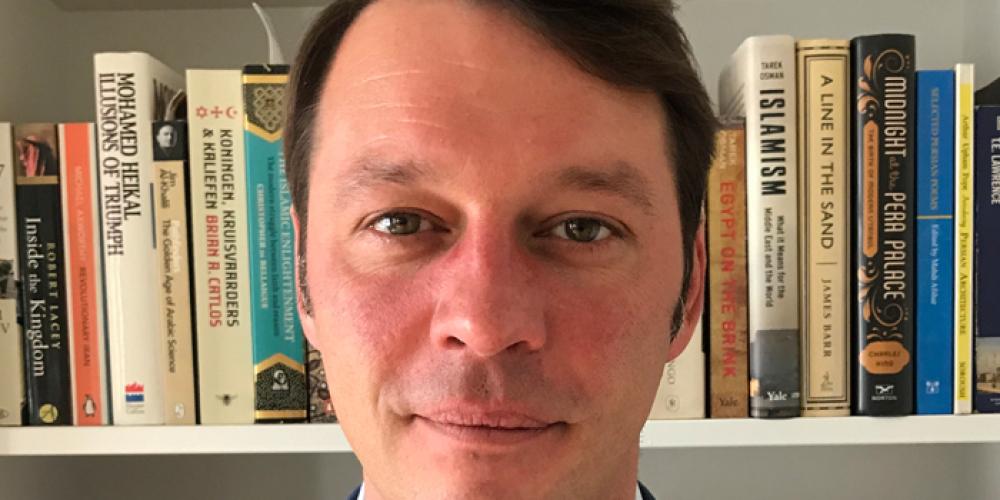
VUB professor and Middle East specialist Koert Debeuf is a sought-after opinion maker and analyst on the war between Hamas and Israel. What drives this academic, a lecturer in Middle East Studies at the Brussels School of Governance, to speak up about this violent conflict that is so much on people’s minds today?
As an academic, what’s your motivation for tackling such a difficult subject?
I teach the course War and Diplomacy in the Middle East. So it seems my duty to clarify what is going on and what we should expect via the media too. The war and its causes are so complicated, it’s normal to look for specialists. And because there are few specialists, I feel I have no choice.
How did you come to be so fascinated by war?
I lived in Cairo for five years and travelled around the Arab world a lot. I visited Syria three times during the war. That was dangerous, but also very interesting. You could ask people why they took up arms and risked their lives. These are questions that we haven’t had to ask ourselves for decades in Europe, but are essential for a lot of people in the rest of the world. Why are people willing to fight and die for an idea? That’s a fascinating question. Of course, war is terrible, with many innocent victims. This often makes research very emotional.
Interview with Koert Debeuf in De Morgen, 9 October
‘The Israelis know every inch of Gaza and yet this has been able to happen. It’s implausible’
“I think, and this is also the rhetoric we have been hearing for months, that Israel displays an arrogant form of supremacy, in the sense of ‘nothing can happen to us, the international community is behind us’. That attitude has undoubtedly led to a slackening of attention. That is the only explanation you can give for it.”
The full interview is available in Dutch here, behind a paywall.
Do you have a public mission?
For me, academic work is inseparable from public service. Of course, this is not equally straightforward for every field. But I see it as a necessary task to alert the public, on a small and large scale, to possible conflict. Apart from that, I think explaining what conflicts are about is an important academic task.
Have you seen any results?
That is always difficult to assess. Sometimes I suspect that politicians adopt an idea or a line of reasoning, but I am never sure. It is clear, though, that we are being listened to. We should be satisfied with that in itself.
Opinion piece by Koert Debeuf in De Standaard, 10 October
Israeli revenge is understandable, but a grave mistake
“Perhaps the most important reason Israel should reflect on its revenge is humanitarian. There have already been hundreds of Palestinian civilian casualties in Israeli bombings. Are those families responsible for Hamas’ barbaric attack? Israel regards Hamas as a terrorist organisation that makes no distinction between military and civilian casualties. Can a country that calls itself the only democracy in the region afford not to make that distinction either?”
The full article is available in Dutch here, behind a paywall.
What impact does it have on your academic career?
I have no idea about that either. I haven’t been able to finish a scientific paper because of numerous media appearances. Sometimes you think that in a few years, people won’t remember why you published less at the time. Anyway, if you have a public responsibility, you don’t think too much about it.
How do you remain independent, or is that not possible?
I always try to be as objective as possible. That’s different from being neutral. When thousands of people die, you can’t be unmoved by that. That’s why it’s necessary to zoom out each time and look at the situation as independently as possible. That’s not easy, but I hope to succeed in this as best I can.
Opinion piece by Koert Debeuf in De Morgen, 12 October
Has Hamas torpedoed a major peace deal?
“The fact that three of Iran’s enemies, the United States, Israel and Saudi Arabia, would form an alliance will have set off alarm bells in Tehran. For Hamas, too, such an agreement goes against everything it stands for.”
The full article is available in Dutch here, behind a paywall.
Do you see the conflict between Israel and the Palestinians ever ending?
It is not impossible to resolve this protracted conflict, but it requires a lot of courage on both sides. I fear that such courage isn’t there today. That said, perhaps the current conflict brings new insights, as it did in Europe after World War II. For Europe, that was one conflict too many and led to European cooperation. Perhaps this conflict in Israel and Palestine is also the conflict too far.